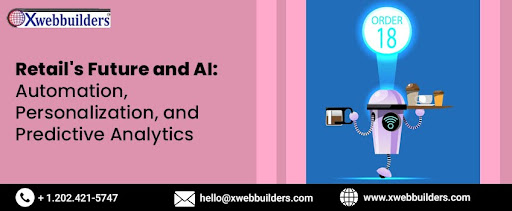
May 11, 2025

The future of retail is being shaped by the integration of artificial intelligence (AI) technologies, revolutionizing the way businesses operate and engage with customers. With automation, personalization, and predictive analytics at its core, AI is transforming the retail industry. In this article, we will explore how AI is driving automation by streamlining processes, enhancing personalized customer experiences by analyzing vast amounts of data, and enabling predictive analytics to anticipate customer preferences and optimize decision-making. The convergence of AI and retail promises increased efficiency, improved customer satisfaction, and better business outcomes. As AI continues to advance, digital marketing agency in Ashburn VA retailers need to embrace its potential and leverage its capabilities to stay competitive in the dynamic landscape of the future.
The future of retail is undergoing a significant transformation with the integration of artificial intelligence (AI) technologies. AI is revolutionizing the way retailers operate, interact with customers, and make informed business decisions.
Automation is a key aspect of AI in retail. It is enabling retailers to streamline various processes, such as inventory management, supply chain logistics, and customer service. With AI-powered automation, retailers can enhance operational efficiency, reduce costs, and improve overall productivity. Personalization is another crucial area where AI is making a substantial impact. By leveraging customer data and AI algorithms, retailers can deliver personalized shopping experiences tailored to individual preferences and needs. AI-powered recommendation systems and targeted marketing campaigns enable retailers to offer relevant product suggestions, personalized offers, and customized content, leading to improved customer satisfaction and loyalty.
Predictive analytics is also playing a pivotal role in the future of retail. By analyzing vast amounts of data, including customer behavior, market trends, and sales patterns, AI-driven predictive analytics enables retailers to make data-driven decisions. From demand forecasting and pricing optimization to inventory planning and trend analysis, predictive analytics empowers retailers to anticipate customer needs, optimize operations, and stay ahead of the competition.
Furthermore, AI is driving the growth of emerging technologies such as chatbots, virtual assistants, and augmented reality (AR) in retail and digital marketing services. Chatbots provide instant customer support, virtual assistants offer personalized shopping guidance, and AR enhances the in-store and online shopping experience. Overall, the future of retail is intertwined with AI. Retailers who embrace AI technologies can gain a competitive edge by enhancing automation, delivering personalized experiences, leveraging predictive analytics, and embracing emerging technologies. By harnessing the power of AI, retailers can create a seamless and immersive shopping journey that meets the evolving expectations of customers in the digital age.
Automation is playing a pivotal role in shaping the future of retail, and its integration with artificial intelligence (AI) is revolutionizing the industry. With AI-powered automation, retailers are experiencing significant advancements in various aspects of their operations. Inventory management is being streamlined through AI algorithms that can analyze historical sales data, current trends, and even external factors to accurately forecast demand and optimize stock levels. This automation reduces the risk of overstocking or understocking, leading to improved inventory turnover and cost savings.
AI-driven automation is also transforming the supply chain logistics in retail. Smart systems can analyze real-time data from multiple sources, including transportation routes, weather conditions, and customer demand, to optimize the delivery process. Automated warehouse management systems powered by AI enable efficient order fulfillment and inventory tracking. Customer service is being enhanced through automation as well. AI-powered chatbots are capable of handling customer inquiries, providing personalized recommendations, and resolving issues in real-time. This automation not only improves response times but also ensures round-the-clock availability, enhancing customer satisfaction.
Moreover, AI automation is revolutionizing the checkout process. Self-checkout systems and cashier-less stores powered by computer vision and AI algorithms enable frictionless transactions, reducing waiting times and enhancing the overall shopping experience. AI-driven automation is also influencing pricing strategies. Dynamic pricing algorithms can analyze market trends, competitor pricing, and customer behavior to optimize pricing in real-time. This automation allows retailers to adjust prices based on demand, competition, or other factors, maximizing revenue and profitability.
Personalization is a key aspect of the future of retail, and the integration of artificial intelligence (AI) is driving significant advancements in this area. AI-powered personalization enables retailers to deliver tailored experiences to individual customers, enhancing engagement and fostering customer loyalty. With AI, retailers can collect and analyze vast amounts of customer data, including purchase history, browsing behavior, demographic information, and social media interactions. AI algorithms can process this data to gain insights into customer preferences, interests, and buying patterns, allowing retailers to create personalized recommendations and targeted marketing campaigns.
This personalized approach helps customers discover new products they are likely to be interested in, improving the overall shopping experience. AI also enables retailers to personalize marketing communications. By analyzing customer data, AI algorithms can segment customers into distinct groups and tailor marketing messages accordingly. This personalization ensures that customers receive relevant offers, promotions, and content, increasing the likelihood of engagement and conversion.
Moreover, AI-powered personalization extends to the in-store experience. With technologies like facial recognition and location tracking, retailers can identify customers as they enter the store and deliver personalized greetings or offers. AI can also be used to create virtual shopping assistants that provide personalized guidance and recommendations to customers based on their preferences.
Predictive analysis, empowered by artificial intelligence (AI), is playing a significant role in shaping the future of retail. By leveraging advanced algorithms and vast amounts of data, predictive analysis enables retailers to make data-driven decisions, anticipate customer behavior, and optimize various aspects of their operations. One key area where predictive analysis is transforming retail is demand forecasting. By analyzing historical sales data, market trends, seasonal patterns, and even external factors such as weather or economic indicators, AI algorithms can predict future demand with a high degree of accuracy. This enables retailers to optimize inventory levels, minimize stock outs or overstocking, and ensure that they have the right products available at the right time.
Furthermore, predictive analysis helps retailers optimize pricing strategies. By analyzing customer behavior, competitor pricing, and market conditions, AI algorithms can determine optimal price points in real-time. This allows retailers to dynamically adjust prices to maximize revenue, take advantage of demand fluctuations, and remain competitive in the market. Predictive analysis also supports personalized marketing campaigns. By analyzing customer data and behavior, AI algorithms can identify patterns and trends, enabling retailers to segment their customer base and deliver targeted marketing messages. This ensures that customers receive relevant offers, promotions, and recommendations, increasing the likelihood of engagement and conversion.
In conclusion, the future of digital marketing services in Ashburn VA, retail is tightly intertwined with the integration of artificial intelligence (AI). AI technologies such as automation, personalization, and predictive analysis are reshaping the retail landscape, driving efficiency, enhancing customer experiences, and empowering data-driven decision-making. Retailers that embrace AI can benefit from streamlined operations, tailored customer interactions, optimized pricing strategies, and improved supply chain management. By leveraging the power of AI, retailers can stay competitive in a rapidly evolving industry, meet the changing expectations of customers, and unlock new opportunities for growth and success. The future of retail lies in harnessing the capabilities of AI to create seamless, personalized, and data-driven experiences for customers.For more information, visit Xwebbuilders.com .